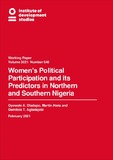Women’s Political Participation and its Predictors in Northern and Southern Nigeria
| dc.contributor.author | Oladapo, Oyewole | |
| dc.contributor.author | Atela, Martin | |
| dc.contributor.author | Agbalajobi, Damilola | |
| dc.coverage.spatial | Nigeria | en |
| dc.date.accessioned | 2021-02-15T10:17:37Z | |
| dc.date.available | 2021-02-15T10:17:37Z | |
| dc.date.issued | 2021-02-15 | |
| dc.identifier.citation | Oladapo, O.A.; Atela, M. and Agbalajobi, D.T. (2021) Women’s Political Participation and its Predictors in Northern and Southern Nigeria, IDS Working Paper 548, Brighton: Institute of Development Studies, DOI: 10.19088/IDS.2021.023 | en |
| dc.identifier.isbn | 978-1-78118-771-5 | |
| dc.identifier.issn | 2040-0209 | |
| dc.identifier.uri | https://opendocs.ids.ac.uk/opendocs/handle/20.500.12413/15951 | |
| dc.description.abstract | The United Nations Development Programme states that women’s political participation is a necessary ingredient for a peaceful and resilient society, yet large gender gaps obstinately persist in many countries around the globe. With a focus on Nigeria and using an analysis of data from Nigeria’s 2015 and 2019 General Elections and Afrobarometer’s 2018 Nigeria Round 7 survey, this paper explores variations of women’s political participation across Southern and Northern Nigeria. In recent times, Northern Nigeria has experienced extensive conflict, and Southern Nigeria outperforms the north in terms of women’s education, participation in paid employment and control of earnings. Given these factors, conventional wisdom among policy actors and researchers would predict that women in Southern Nigeria should have considerably higher rates of political participation than those in Northern Nigeria. However, digging deeper into the available data on political participation, the paper suggests that factors such as education and employment do not predict the dimensions of women’s political participation or can predict the unexpected. The paper concludes that policymakers may need to look beyond these conventional factors when supporting programmes on women’s political participation in Nigeria. More research is needed into contextual factors to better understand what lies behind the varying levels of women’s political participation in Northern and Southern Nigeria. | en |
| dc.description.sponsorship | Foreign, Commonwealth & Development Office | en |
| dc.language.iso | en | en |
| dc.publisher | Institute of Development Studies | en |
| dc.relation.ispartofseries | IDS Working Paper;548 | |
| dc.rights | This is an Open Access paper distributed under the terms of the Creative Commons Attribution 4.0 International licence (CC BY), which permits unrestricted use, distribution, and reproduction in any medium, provided the original authors and source are credited and any modifications or adaptations are indicated. | en |
| dc.rights.uri | http://creativecommons.org/licenses/by/4.0/ | en |
| dc.subject | Gender | en |
| dc.subject | Participation | en |
| dc.subject | Politics and Power | en |
| dc.title | Women’s Political Participation and its Predictors in Northern and Southern Nigeria | en |
| dc.type | IDS Working Paper | en |
| dc.rights.holder | Institute of Development Studies | en |
| dc.identifier.team | Power and Popular Politics | en |
| dc.identifier.doi | 10.19088/IDS.2021.023 | |
| rioxxterms.funder | Default funder | en |
| rioxxterms.identifier.project | Default project | en |
| rioxxterms.version | VoR | en |
| rioxxterms.versionofrecord | 10.19088/IDS.2021.023 | en |
| rioxxterms.funder.project | 9ce4e4dc-26e9-4d78-96e9-15e4dcac0642 | en |
Files in this item
This item appears in the following Collection(s)
Except where otherwise noted, this item's license is described as This is an Open Access paper distributed under the terms of the Creative Commons Attribution 4.0 International licence (CC BY), which permits unrestricted use, distribution, and reproduction in any medium, provided the original authors and source are credited and any modifications or adaptations are indicated.


